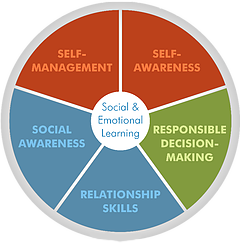The Collaborative for Academic, Social, and Emotional Learning has identified five interrelated sets of cognitive, affective and behavioral competencies. The bibliotherapy lessons on this website coincide with these five competencies. Below are explanations of each competency and more information can be found at www.casel.org.

- Self-awareness is being cognizant of one’s own thoughts and emotions and how these affect behavior. Self-awareness also includes being optimistic and realistically confident in one’s abilities, while also acknowledging one’s weaknesses.
- Self-management is the ability to control and manage one’s thoughts, feelings, and behaviors. Self-management involves managing personal stress, planning thoughtfully, and controlling impulsive reactions. Thoughtful planning includes working on self-improvement, such as identifying and working toward personal and academic goals.
- Social awareness is the ability to understand others’ perspectives and to be thoughtful of others’ feelings, even when others may disagree and have differing opinions. Additionally, when children are socially aware they take into account social and ethical norms. They also look to others for support, carefully considering available and trusted supportive resources in their family, school, and community.
- Relationship skills form the basis for friendship and positive interactions across the lifespan. Building strong relationships requires strong communication skills, such as the ability to clearly communicate and actively listen. Healthy relationships also require cooperation, negotiation, conflict resolution strategies, and the ability to resist damaging peer pressure. Relationships require give and take, such as offering help to others and asking for help when needed.
- Responsible decision-making is the ability to carefully consider potential outcomes of our decisions, considering if a choice is safe, ethical, respectful of social norms, and if outcomes from a choice will be beneficial to oneself and others.
Editor Review Date